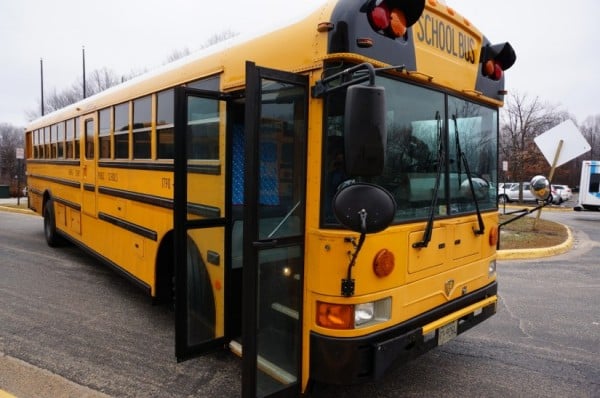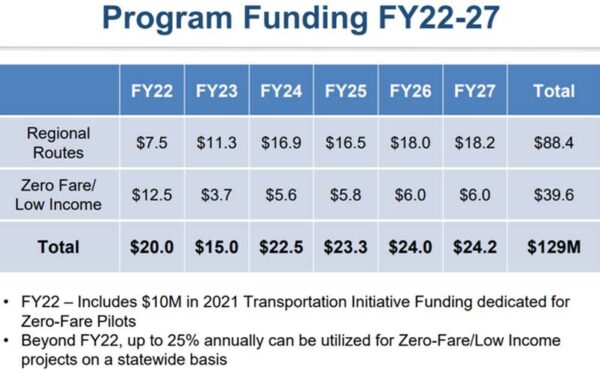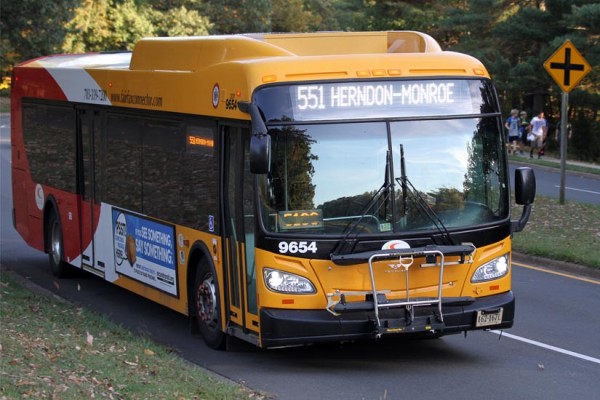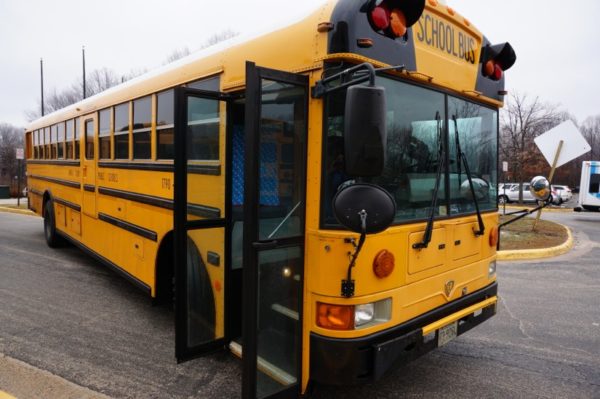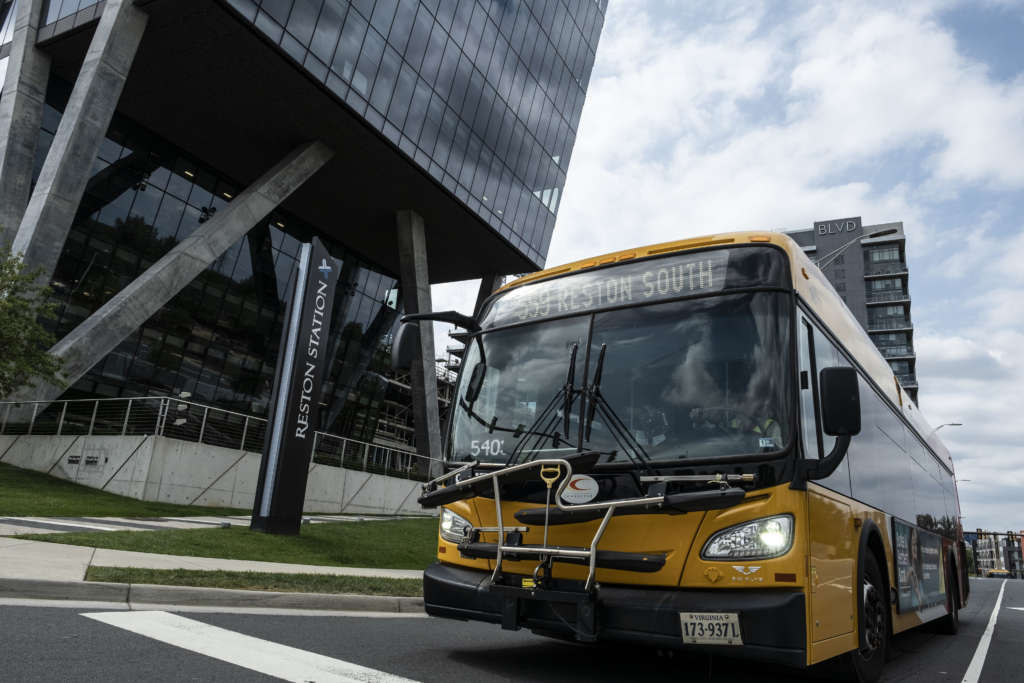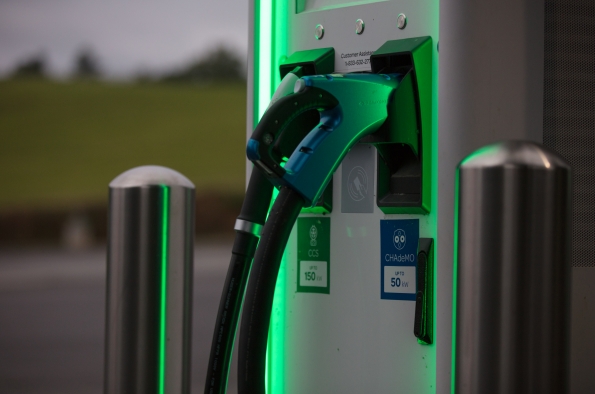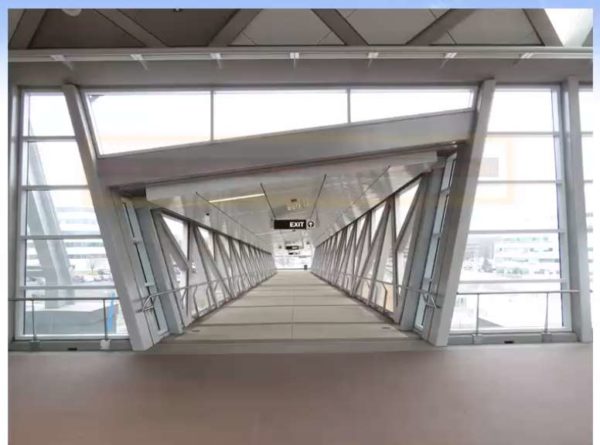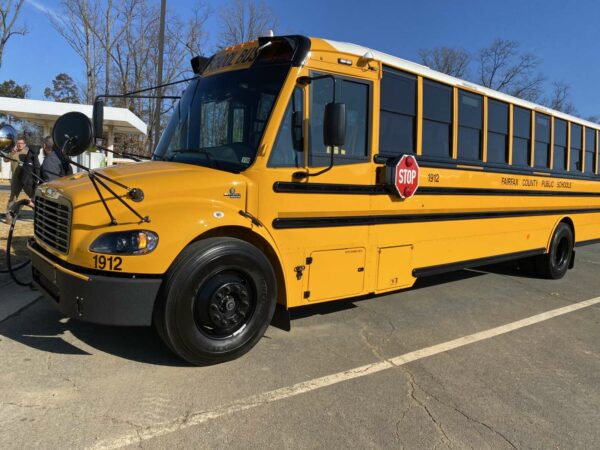
Fairfax County Public Schools will soon add another 10 electric school buses to its fleet, thanks to a new $2.65 million state grant.
19 school districts, including FCPS, will collectively receive more than $10 million in the latest round of allocations from Virginia’s Volkswagen Environmental Mitigation Trust — enough to replace 83 diesel school buses with electric and propane-fueled vehicles, Gov. Ralph Northam announced last Wednesday (Aug. 19).
“Virginia’s investments in electrifying the school bus fleets is an important and critical part of our comprehensive approach to reducing pollution,” Virginia Department of Environmental Quality Director David Paylor said in the news release. “Collectively, the replacement of these school buses is calculated to reduce carbon dioxide emissions by 10,000 tons per year, and will save one million gallons of diesel fuel, equivalent to removing 2,000 cars from the road.”
Administered by Department of Environmental Quality, the Volkswagen trust comes from Virginia’s $93.6 million share of the $2.7 billion settlement that the automobile manufacturer agreed to in 2016 after violating the Clean Air Act by cheating vehicle emissions tests.
Virginia announced the first round of funding from the trust on May 7, awarding over $9.4 million to help local governments purchase electric vehicles for their fleets. Fairfax County got more than $4 million for shuttle buses, waste and recycling trucks, and a truck for its public library system.
FCPS currently has eight electric buses that were placed in service this past May. The first bus arrived in January as part of a pilot program developed by Dominion Energy, which rolled out 50 buses across the state with plans to replace all diesel school buses with electric ones by 2030.
However, the future of Fairfax County’s transition to electric school buses has become a little hazier after the Virginia House of Delegates rejected an expansion of Dominion’s program that would’ve added 1,000 more electric school buses, a sign of legislators’ growing wariness of the utility company’s influence.
During its spring special session, the General Assembly voted to create an Electric Vehicle Grant Fund to help with the costs of adding electric school buses. Northam signed the bill into law, but the program has no funding yet.
Dominion confirmed that the newly awarded DEQ grants are unrelated to its program, which covered the difference in cost of an electric bus versus a diesel one as well as the cost and installation of charging stations.
“Children deserve clean transportation to school and we’re excited to see Virginia moving that way,” Dominion spokesperson Peggy Fox said. “The goal with our innovative program was to accelerate the adoption of electric school buses, so we’re thrilled to see more of these clean-running buses with zero emissions rolling out across Virginia.”
The utility says it is still offering to install charging stations for school districts for free in exchange for the ability to return stored energy back into the electric grid when the buses are idle and the chance to buy the bus batteries after the vehicles pass their life span.
“We will be involved if schools systems chose so,” Fox said in an email.
FCPS says its transportation department “continues to evaluate” its existing electric buses and work with vendor Thomas Built Buses to make adjustments.
While shifting to electric buses is expected to reduce operational and maintenance costs in the long run, the district’s transition is currently limited by the availability of funding and charging infrastructure, which affects where the buses can be assigned.
“As more funding opportunities become available, as the technology is refined for school division needs, and as charging infrastructure becomes readily available, FCPS plans to transition its fleet of 1,625 buses to electric,” FCPS spokesperson Julie Moult said by email.
The 10 new buses funded by the DEQ grant are scheduled to arrive in March 2022.
“Operation and maintenance of the electric buses are being monitored and evaluated for efficiency of operation and cost savings,” Moult said.
Just days before the new school year is set to begin, Fairfax County Public Schools says it hasn’t hired enough bus drivers to fully serve the thousands of students who rely on the bus fleet to travel to and from school.
In a message posted to its social media channels, FCPS advised parents to walk with their children or drive them to school if possible, stating that “there may be delays impacting bus routes” across the county when school starts on Monday (Aug. 23).
FCPS says it is unable to provide exact numbers for the gap in staffing “because the situation is so fluid,” but the shortage is part of a nationwide trend that has resulted in reports of buses arriving hours late or not showing up at all from Stafford County and Lynchburg City to Milwaukee, Wisconsin, and Broward County in Florida.
“Like other school districts across the country, we do have more shortages than is usual for this time of year,” FCPS spokesperson Julie Moult said. “We are actively recruiting and offering a $2,000 signing on bonus and are working to limit any potential disruption.”
Moult added that students will not be penalized if they are late to class due to a delayed bus.

The bus driver shortage is the latest instance of staffing challenges interfering with efforts to resume five days of in-person learning for more than 180,000 students in Virginia’s largest public school district.
After the COVID-19 pandemic prompted a shift to virtual learning in March 2020, teachers’ wariness of returning to physical classrooms earlier this year led FCPS to hire hundreds of classroom monitors that provided support and supervision for in-person students.
FCPS then delayed its Extended School Year classes for students with disabilities this summer, because it didn’t have enough teachers, especially for its special education program.
According to an ABC News report, it’s not unusual for schools to be short-staffed on bus drivers at the beginning of an academic year, but this year’s deficits have likely been exacerbated by health concerns: buses provide little space for distancing even when many students were still learning virtually, and drivers are often retirees, a demographic that has been hit hard by the pandemic.
Curt Macysyn, executive director for the National School Transportation Association, told ABC News that money and competition from commercial transportation jobs could also be factors.
The Fairfax Education Association, an FCPS employees’ union that represents more than 400 transportation workers, said in a statement that it believes higher pay would help alleviate the driver shortage:
We certainly know that our transportation staff play an important role in the lives of our students. This shortage will potentially delay the start of a school day, force multiple runs to cover all routes, and put drivers into a position of driving many more students than should be considered safe on a bus during this COVID-19 pandemic. Social distancing will not be possible. Masks will be required. We believe that increases to hourly wages, in addition to the signing bonuses, would attract and especially retain our current drivers and attendants. We are committed to working with FCPS to address this situation.
As of 2018, the national median salary for bus drivers was $16.56 per hour or $34,450 per year, according to the Bureau of Labor Statistics. FCPS starts wages for school bus drivers at $19.58 per hour, on top of offering a $2,000 bonus to new drivers this year.
FCPS says on its website that the shortage will require available drivers to more regularly cover two scheduled routes back-to-back that typically would be served by two different buses. These “double back” runs may affect pick-up and drop-off times before and after school.
FCPS has set up a webpage that will list delayed buses, which can also be tracked through the Here Comes the Bus mobile app.
“We understand that any transportation delay is frustrating and has an impact on the entire family,” FCPS said. “Thank you for your flexibility as we work through some of our challenges with transportation this fall. Our goal is to serve each and every one of our students and our families with safe, efficient transportation.”
Metrobus Service Will Expand This Weekend — Starting Sunday (June 6), Metrobus will operate late-night service to 2 a.m. every day of the week on 36 of its busiest routes. There will also be more frequent service and restored service on more than 60 routes, bringing bus service to approximately 85% of pre-pandemic levels. [WMATA]
Independence Day Fireworks Coming to Lake Fairfax — “In honor of the nation’s Independence Day, Lake Fairfax will once again host a fireworks display. The event will take place on Saturday, July 3, 2021. Preregistration and capacity limits will be in place. Details will be posted as they become available on the Lake Fairfax Park website.” [Fairfax County Park Authority]
Chandon Park Playground to Be Replaced — Demolition and construction work has started on the playground at Chandon Park in Herndon. Expected to finish by July 31, the $140,000 project will introduce new equipment, subsurface drainage, and other upgrades to replace the playground, which was originally installed in the 1990s and no longer meets current safety guidelines. [Fairfax County Park Authority]
CACI Joins Fortune 500 List — For the first time in its history, CACI International was named a Fortune 500 company, an annual ranking of the biggest companies in the country based on revenue. Previously based in Arlington, the defense contractor officially opened its new corporate headquarters in Reston on May 28. [Business Wire]
Photo via vantagehill/Flickr
Fairfax Connector suspended fare collections last year as a temporary health measure in response to the COVID-19 pandemic, but the public bus system is considering longer-term adjustments to its fare policies with support from a new state grant program.
The Fairfax County Department of Transportation is one of 12 transit agencies in Virginia that have expressed interest in the Department of Rail and Public Transportation’s new Transit Ridership Incentive Program (TRIP), which will fund projects that increase connectivity in highly populated areas or remove barriers for low-income individuals by reducing or eliminating fares.
While fare collection resumed on Jan. 4, county leaders see reducing or subsidizing trip costs as one way to encourage more people to ride the Connector, which is the largest local bus system in Northern Virginia, transporting approximately 30,000 passengers on 91 routes in ordinary times.
“Access to transit is crucial in promoting equity county-wide and for many a barrier is cost,” Fairfax County Board of Supervisors Jeff McKay said. “Our Department of Transportation is committed to looking into how we can provide aid to those experiencing economic hardship.”
Created by the General Assembly during its 2020 session, TRIP was conceived before the novel coronavirus arrived in the U.S., but Virginia Transportation Secretary Shannon Valentine told the Commonwealth Transportation Board during a May 18 workshop that the pandemic illustrated how vital public transportation is for essential workers, DCist reported.
“Fares turned out to be an obstacle. So we are really trying to use this as an opportunity,” Valentine said, according to DCist.
DRPT has split TRIP into two programs: one focused on regional connectivity, which could include everything from integrated fare collection systems to the creation of bus-only lanes on significant routes, and one focused on reducing the impact of fares on low-income users, which could involve eliminating fares, creating zero-fare zones, or providing subsidized or free passes.
Virginia has allocated a total of $129 million to the TRIP initiative through fiscal year 2027, including $88.4 million for the connectivity program and $39.6 million for the fare program, according to a presentation that DRPT delivered to the Commonwealth Transportation Board.
Legislators limited the fare reduction program to 25% of the initiative’s annual funding, but the General Assembly gave the program an additional $10 million in the state’s fiscal year 2022 budget, raising its total to $12.5 million for the upcoming fiscal year, which begins on July 1.
DRPT released a draft policy last week outlining how TRIP will be implemented, including how projects will be evaluated for grant funds. The resolution is open for public input through June 18, and the CTB is scheduled to vote on it on June 23.
The department has also made a draft of the program’s application guidelines available for public comment until July 7. Read More
Fairfax County is taking a small but crucial first step toward electrifying its sprawling government vehicle fleet, thanks to more than $4 million in state grants.
Gov. Ralph Northam announced on Friday (May 7) that the county will receive $4.4 million from the first round of Virginia’s Clean Air Communities Program, an initiative that launched in November using $20 million from the state’s Volkswagen Environmental Mitigation Trust.
Three of the five awarded grants went to Fairfax County agencies:
- Department of Transportation: $2.9 million for four shuttle buses and chargers
- Department of Public Works and Environmental Services: $1.2 million for four solid waste and recycling trucks and chargers
- Department of Vehicle Services/Department of Procurement and Material Management: $205,275 to purchase a medium-duty truck and charger for the public library system
The other recipients are the Metropolitan Washington Airports Authority, which will get $3.9 million to purchase five shuttle buses and chargers, and Amherst County, which got $998,301 for two trucks, a shuttle bus, and chargers.
“Supporting clean transportation solutions is a vital part of our efforts to combat climate change and improve air quality in the Commonwealth,” Northam said. “These investments will reduce harmful vehicle pollution, which disproportionately impacts marginalized communities, and help accelerate an equitable transition to a cleaner economy for all Virginians.”
Fairfax County will use its grant funds to launch an electric vehicle pilot as part of a broader push to eliminate fossil fuels from the county’s transportation operations and achieve carbon neutrality by 2040.
The county’s Joint Environmental Task Force recommended in October that the Fairfax Connector bus fleet transition to electric vehicles or other non-carbon-emitting alternatives by 2030, followed by public school buses and non-bus vehicles in 2035.
The county has approximately 6,347 vehicles in its overall fleet, including 1,540 Fairfax County Public School buses, according to the Department of Vehicle Services.
While the new pilot will kick off the conversion of the county government fleet, FCPS received its first electric school buses in January from a statewide initiative led by Dominion Energy, which has pledged to replace all diesel buses in the state with electric ones by 2030.
The county first utilized electric vehicles for public transit in November, when the autonomous Relay shuttle kicked off passenger service in Merrifield for a year-long pilot project.
“To cut carbon admissions, we have to reimagine the way in which we travel,” Fairfax County Board of Supervisors Chairman Jeff McKay said. “As a county, we are already actively moving towards cutting our emissions from our public transit and this will move us closer to our end goal.” Read More
Passengers on several Fairfax Connector service will have to use a different bus stop.
The bus stop at the intersection of Colts Brook Drive and Sunrise Drive has been permanently removed due to sidewalk construction, according to a statement released online.
The county’s department of transportation is constructing a missing segment of walkway along Sunrise Valley Drive westbound between Colts Brook Drive and Hitchcock Drive, according to Anna Nissinen, a county spokeswoman told Reston Now.
A six-foot-wide asphalt walkway is planned in the area. The project would also upgrade existing curb ramps so that they are ADA compliant.
The bus stop at Colts Brook Drive was removed to encourage pedestrians to cross Sunrise Valley Drive at the nearest signal location at Monroe Street using the marked crosswalks, she said. The walkway is intended to provide another way for pedestrians to access the Herndon Metro Station.
Passengers are encouraged to use another stop with the identification number of 3540 at the intersection of Sunrise Valley Drive and Milburn Lane instead.
The bus stop will no longer be served by routes 924, 926, 927, 929, 937, 950, 952.
The project will likely be completed next month.
⚠️ Effective March 25, 2021, Stop ID# 3494 at Sunrise Valley Dr. & Colts Brook Dr. will be removed due to construction and will no longer be served by Routes 924, 926, 927, 929, 937, 950, 952. Passengers should use alternate Stop ID #3540 at Sunrise Valley Dr & Milburn Ln. pic.twitter.com/dU9EDN3mR9
— Fairfax Connector (@ffxconnector) March 15, 2021
Now, Reston residents can access detailed local transportation data with a click.
An interactive Reston Transportation Data Hub came online earlier this week, offering compiled data sets detailing how and when Restonians move about town.
The tool features vehicle, pedestrian, bicycle, and public transit data. Much of the data is from November 2019.
“This system provides a new way for residents to understand both the big picture and the details of our current and planned transportation system,” Walter Alcorn, Hunter Mill District Supervisor and Transportation Committee Chair, wrote in the press release. “Whether you drive, ride rail/buses, walk or bicycle, information on how the system fits together and coming improvements is critical. This data hub is an important step forward.”
Beyond that, the tool also maps upcoming transportation and infrastructure projects including timelines and costs. It also provides a comprehensive map of pedestrian and biking trails in Reston.
A high level analysis shows that traffic volume tends to be higher in Reston during the evening peak rush hour than the morning equivalent.
The report speculates that, along with commuting, this is due to the combination of errands and non-work trips that more often happen in the evening.
There are also other data hubs being planned, including ones showing zoning activity and parks that will show how land is being used in Reston.
Full press release below:
Reston residents, businesses and stakeholders can now access the latest information about transportation in the Reston area. The online, interactive Reston Transportation Data Hub features vehicle, pedestrian, bicycle, and public transit data, in addition to information about planned infrastructure improvements and transportation projects for Reston.
The Transportation Data Hub is one component of the Reston Data Visualization project. Led by the Fairfax County Department of Planning and Development Urban Center’s Section and GIS Department, the project focuses on data transparency associated with Reston development and infrastructure improvements, including information about mobility, parks, and zoning activity.
“This system provides a new way for residents to understand both the big picture and the details of our current and planned transportation system,” said Walter Alcorn, Hunter Mill District Supervisor and Transportation Committee Chair. “Whether you drive, ride rail/buses, walk or bicycle, information on how the system fits together and coming improvements is critical. This data hub is an important step forward.”
Additional Data Hubs are planned for the Reston Data Visualization project – including a Zoning Activity Data Hub and a Parks Hub – for sharing land use information with the Reston Community.
The main Reston Data Visualization page, which includes the Reston Transportation Data Hub, can be found at https://reston-data-visualization-fairfaxcountygis.hub.arcgis.com/. For questions about the new Transportation Data Hub or the Reston Data Visualization project, contact the Department of Planning and Development’s Urban Centers Section.
The Transportation Data Hub is a collaboration between Fairfax County’s Department of Planning and Development and Department of Transportation.
Fairfax County Public Schools is getting its first electric school bus today as part of a statewide initiative led by Dominion Energy.
The bus is expected to arrive at the Stonecroft Transportation Center in Chantilly. It is the first of eight vehicles that FCPS will receive from Dominion in an initial deployment of 50 buses throughout Virginia.
FCPS says it anticipates getting the remaining seven buses by the end of January.
Made by Thomas Built Buses, the new vehicles will join Fairfax County’s fleet of approximately 1,625 diesel-fueled school buses, one of the largest in the country.
“Electric school buses in FCPS will benefit not only the school division and its community, but the entire national capital area,” FCPS says. “…They will help reduce carbon emissions, serve as a resource for national emergency planning efforts, and provide stability and capacity to the grid with meeting increasing energy demands.”
While electric buses are more expensive to purchase than diesel ones, they are cheaper to maintain and operate. FCPS is covering the difference in the initial cost with a grant from Dominion Energy, which also funded the installation of electric charging infrastructure at the Stonecroft facility and is responsible for maintaining the equipment.
FCPS says training for bus drivers, maintenance technicians, and other staff will start once the first bus arrives. The vehicles will undergo testing before being assigned to routes in early to mid-April, though whether there will be any students for them to transport at that time remains to be seen.
The arrival of Fairfax County’s first electric bus is a welcome step forward for community members and public officials who have been advocating for a transition to electric vehicles, citing health and financial benefits as well as environmental ones.
One of the most prominent advocates for electric school buses has been the Fairfax County branch of the national climate advocacy group Mothers Out Front, which launched a campaign in 2019 calling on FCPS to commit to converting its entire fleet to electric power by 2024.
“We are so excited for Fairfax to get its electric school buses on the ground and running,” Mothers Out Front Fairfax co-leader Barbara Monacella said in a statement. “…Every electric school bus we add to our fleet reduces the air pollution from diesel that harms our kids’ health, and brings us closer to our goal of converting every bus in order to reduce emissions and fight climate change.”
The community advocacy group has teamed up again with Del. Mark Keam (D-35th) on legislation that would create a state fund for school districts to purchase electric buses, a move aimed at addressing concerns about the amount of control Dominion has over the current initiative.
Last year, lawmakers opted to pursue the utility company’s pilot program instead, but Monacella says Keam will reintroduce his bill when the Virginia General Assembly convenes for its 2021 session on Wednesday (Jan. 13).
“We applaud the buses Fairfax has added, and we hope to add more through the state grant fund in the future,” Monacella said. “With every electric bus we add, we move the needle for our kids’ health and their future in the face of climate change.”
Fairfax Connector will begin resuming fare collection on Jan. 4 following a months-long hiatus that began in March due to the COVID-19 pandemic.
The local bus system will also begin boarding from the front door instead of rear door entry, another move that was undertaken to limit the spread of the novel coronavirus.
The move comes as doses of two vaccines produced by Moderna and Pfizer are delivered in Virginia and throughout the country to front-line health care workers and individuals in long-term care facilities.
Metro will also begin resuming the collection of bus fares on Jan. 3.
In order to maintain protect passengers and bus operators, the county has installed polycarbonate driver shields on buses. Face coverings continue to be mandatory inside buses.
Since May, staff has given 66,000 face coverings to passengers without masks. Passengers are encouraged to practice social distancing when possible, stay at home if they are sick, and wash hands often with soap and water.
Transdev, the bus systems operations continue, continues to step up cleaning and disinfecting of bus interiors and commonly used areas like door handles and handrails, according to the county.
The Fairfax County Board of Supervisors indicated interest in a pilot program for electric-powered buses during its transportation committee meeting on Tuesday (Nov. 10).
During the meeting, Fairfax County Department of Transportation Director Tom Biesiadny delivered an presentation that explained the “ins and outs” of electric vehicles and and included a proposal for moving forward with a pilot plan.
The next step would be to return to the supervisors with a more in-depth financial plan that includes details such as when and where this would take place, and how long the demonstration would last, which could be in the early part of 2021, Biesiadny says.
“This is exciting,”said Board of Supervisors Chairman Jeffrey McKay. “Clearly we need to jump into this area and we need to do it quickly.”
Providence Supervisor Dalia Palchick supported a pilot because it would help ensure the county implements these changes correctly.
“This is the future,” she said. “We need to stop going backward. I’m hopeful to see a plan not just to see a pilot but do a demonstration project, which in my mind, means ‘how can we move forward?'”
A pilot with four buses could cost between $3.8 million and $4.2 million, a gross cost that does not take into account sources of funding. Some money has been set aside through a bus replacement program, and there are grants available, Biesiadny said.
FCDOT has in-house and external expertise from Fairfax’s “ongoing partnership with Dominion Energy” and the Richmond Highway Bus Rapid Transit team to draw from, said Tom Reynolds, the FCDOT Section Chief of Transit Services Division.
The pilot would help the department learn about the buses’ range and charging, how they perform during different seasons of the year and on various local and express routes, and what staff training needs to be done, Reynolds said.
“The sooner we do the pilot, the sooner we see the results of it, the sooner we can start to make longer-term decisions about some of the capital costs that would be necessary if we were to expand this,” McKay said.
When the county talks about costs, Palchik — who said she developed childhood asthma living in the area — and Braddock Supervisor James Walkinshaw emphasized the costs of treating asthma and the health impacts of poor air quality.
“In Virginia, we spend $87 million a year because of asthma hospitalization,” Walkinshaw said. “Fairfax County is lower, but Route One is higher. Annandale is higher. Other parts of the county are higher. It would be a small thing, but as we look at this pilot, we might want to look at locating it in parts of the county that have been hit harder by asthma.”
Fairfax County’s first effort to introduce electric vehicles into public transit came this year with the autonomous Relay shuttle now operating in the Mosaic District. That demonstration project is a partnership with Dominion Energy, Biesiadny said.
Photo via Electrify America
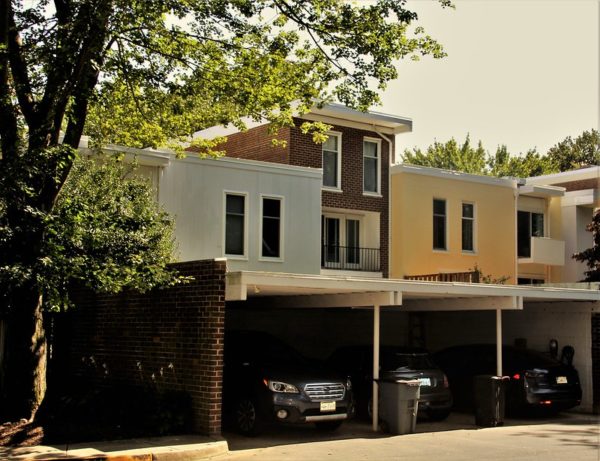
New Roles for County Bus Drivers — Fairfax County Public Schools’ bus drivers are taking on new roles during a hiatus in in-person learning. Some were matched with temporary jobs based on their skill set. [NBC 4]
Volunteers Sought for Laptop and Book Distribution — Volunteers are “greatly needed” to help schools in Reston and Herndon, according to Fairfax County Public Schools. Volunteers can sign up to help with curbside library book distribution, weekend food distribution packing, helping with laptop distribution, and other tasks. [Fairfax County Government]
Virtual Appraisal Roadshow Set for Tomorrow — Reston Association is hosting a virtual appraisal roadshow from 11 a.m. to noon tomorrow (Tuesday). Experts will be on-site to educate the audience about facts and the worth of items selected by residents. [RA]
Photo via vantagehill/Flickr
Fairfax Connector will resume full service on all routes beginning Aug. 29, bringing a return to a new normal after months-long disruptions in service.
The bus service — which is the largest local bus system in the state — will also feature new services, including a new commuter route from Stringfellow Road Park and Ride to Southwest DC.
Fairfax County Board of Supervisors Chairman Jeff McKay thanks customers for being patient with past service reductions. Throughout the pandemic, the bus service maintained roughly 70 percent of its service in order to cater to customers who depend on it for essential jobs and vital services.
“As we return to full service, the health and safety of Fairfax Connector passengers and personnel continue to be our top priority. Working together to diligently follow public health and safety guidelines will result in safer travel conditions for all,” McKay wrote in a statement.
A breakdown of new service being offered is below:
Route 699: Enhanced service on this route includes two additional morning and afternoon rush hour trips from the Fairfax County Government Center to Downtown Washington, D.C. (Foggy Bottom); adjustments to the departure times to better align with rider demand; and morning and afternoon rush hour reverse commute trips from Downtown, Washington, D.C., to the Fairfax County Government Center. This route is supported by the Northern Virginia Transportation Commission (NVTC) Commuter Choice Program and I-66 toll revenues.
Route 334: Enhanced weekday service operating every 30 minutes during rush hour and every hour during non-rush hour to better serve the Transportation Security Administration (TSA) facility in Springfield by way of Springfield Center Drive and Metropolitan Center Drive, with access to the Franconia Springfield Metrorail Station, the Defense Logistics Agency, and the Army Museum.
Routes 340/341: Minor route adjustments to maintain efficiency and dependability.
Transdev, the bus system’s operations contractor, will implement improved cleaning protocols, especially on common touchpoints like door handles and handrails.
Customers must continue to enter and exit the bus through the rear doors. A face mask is still required while riding the bus.
Riders are encouraged to practice social distancing by keeping six feet apart, when and if possible.
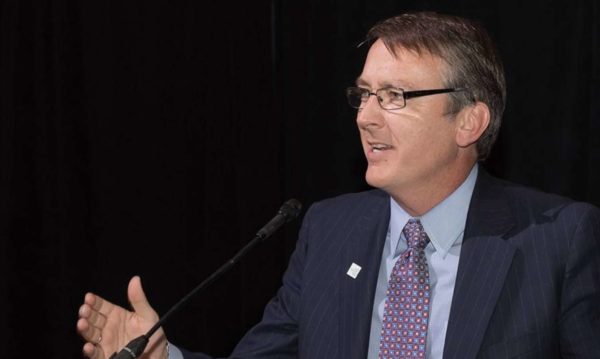
Fairfax County Public Schools Superintendent Scott Brabrand has no plans to furlough bus drivers and food service workers, despite the virtual start to school next month.
In a letter sent to the community last night (Monday), Brabrand said he plans to “keep our FCPS family 100 percent intact” as the school year begins. Bus drivers are set to return to work on August 25. Some will deliver meals to specific locations or along select bus routes.
In other cases, the school system may provide other work assignments like facilities maintenance, student support, and delivering books and supplies to schools.
Brabrand also said the school system is working on an alternative plan to keep all food service workers employed throughout the academic years. Funding for service food service employees, which primarily relies on the sale of food, has taken a major hit due to school closures.
Here’s more from Brabrand’s letter:
I’d like to thank our food service employees for your heroic efforts to provide grab and go meals for our families since our schools shut down in March. More than 2 million meals have been served so far. Food distribution will continue through the rest of summer break and once the school year begins.
A community survey is underway to determine meal demand for the upcoming school year. The results will determine if changes to the food striation schedule are warranted.
Other staff — including security guards and office employees — may also be asked to shuffle their job duties to support virtual learning.
The FCPS School Board is meeting today for a day-long work session to continue formalizing plans for the return to school.
Photo via FCPS
After a variety of issues and delays, Silver Line’s Phase Two is now aiming for completion in spring 2021.
Updates on the second phase of the Silver Line were briefly mentioned due to time constraints during the Transportation Committee yesterday. Phase Two will connect six new stations to the Wiehle-Reston East, bringing Metro riders out to Ashburn.
Hunter Mill District Supervisor Walter Alcorn said that he briefly talked to Paul Wiedefeld, the general manager and CEO of the Washington Metropolitan Area Transit Authority, last week.
“He assured me that — at least as of early last week — the Phase Two opening is still on track for next spring,” Alcorn said. “I’m sure there are probably a dozen ways that that can change, but for now, at least it is moving forward, according to that schedule.”
Phase Two is 98% complete overall, according to the presentation for Martha Elena Coello with the Fairfax County Department of Transportation.
The project has faced several delays, from train control software issues to flawed rail ties. The presentation addressed the ongoing issues the project has faced, including:
- concrete panel deficiencies
- concrete ties/cross level deficiencies
- fouled ballast
- automatic train control
- insulated joints replacement
Work is expected to finish on the new rail, systems, stations and yard later this year or early 2021.
Recently, “substantial work” wrapped up on the garage at the Innovation Center Metro station, according to the presentation. The garage, which costs roughly $52 million, is 98% complete and awaiting its official occupancy permit, according to the presentation.
Bus loop work is expected to be done at the Herndon station garage this month.
The presentation also provided an update on the bus service plan for Phase Two. Currently, Fairfax County is seeking public input on the plan.
More from Fairfax Connector:
Welcome to the Reston-Herndon Area Bus Service Review final round of public input!… Fairfax Connector is considering a variety of options to improve bus service to, from, and around the new stations in Fairfax County.
Our previous round of outreach proposed three bus transit service alternatives, each with their own set of unique characteristics. We ranked the alternatives based on coverage, average travel times between key origin-destination pairs, and ridership potential (see right). We also listened to what Connector riders and nonriders had to say through several public meetings and an online survey. Based on feedback received, the preferred alternative presented today is cost-neutral, and includes the best elements of the three originally proposed scenarios and existing service.
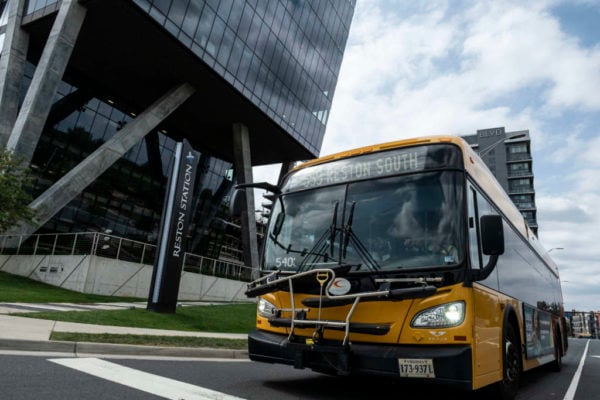
The Fairfax County Department of Transportation has selected its preferred bus service plan for the Fairfax Connector in Reston and Herndon.
County planners say the plan “aims to improve on-time performance and streamline service to meet the needs of the community and commuters.”
Here’s more from FCDOT on what’s being considered:
Some of the key improvements to the bus service in the area include new and more direct connections and routes; new connections to Chantilly, Centreville and the Dulles Corridor; service to Northern Virginia Community College (Loudoun Campus); and routes travelling from Sterling to Herndon. The plan, which also uses elements from all three of the proposed alternatives, shortens travel time, increases access for transit dependent populations, and maintains bus stop coverage at most locations.
The implementation of the proposed service changes will coincide with the start of the new Metrorail Silver Line service and will provide connections to the Reston Town Center Station, Herndon Station, Innovation Center Station, Dulles Airport Station, Loudoun Gateway Station and Ashburn Station.
The plan will include three new routes: Chantilly to the Dulles Corridor, Northern Virginia Community College’s Loudoun campus, and Sterling too Herndon. Planners say the proposal shortens travel time and creates more direct connections.
The average travel time could be reduced from 57.3 minutes to 49.4 minutes. The updated plan would also improve service to more households, especially those that are low-income.
More information about the proposal is available online.
The county is seeking feedback via an online survey and via email at [email protected]. Residents can also call the county at 703-877-5600, extension 711, or mail comments to 4050 Legato Road, Suite 400.
The county is also hosting a virtual public meeting on the plan with Hunter Mill District Supervisor Walter Alcorn and Dranesville District Supervisor John Foust on Wednesday, July 8 from 6:30-7:30 p.m.
Staff photo by Jay Westcott


